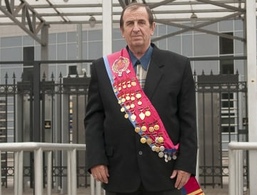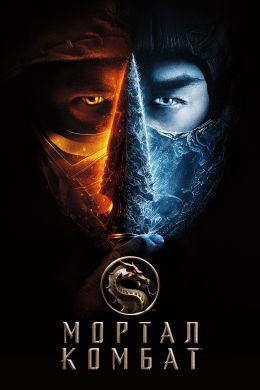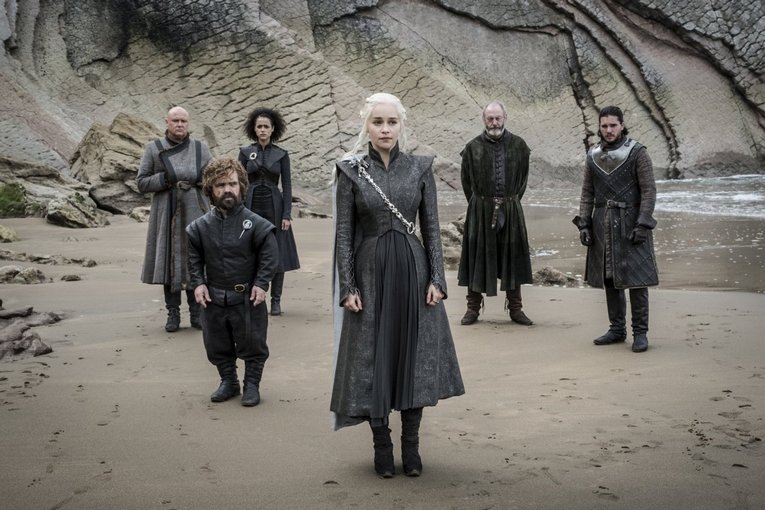A brief history of the emergence of the modern Olympic Games: the first sports, symbols and features of the holding
History of the Olympic Games
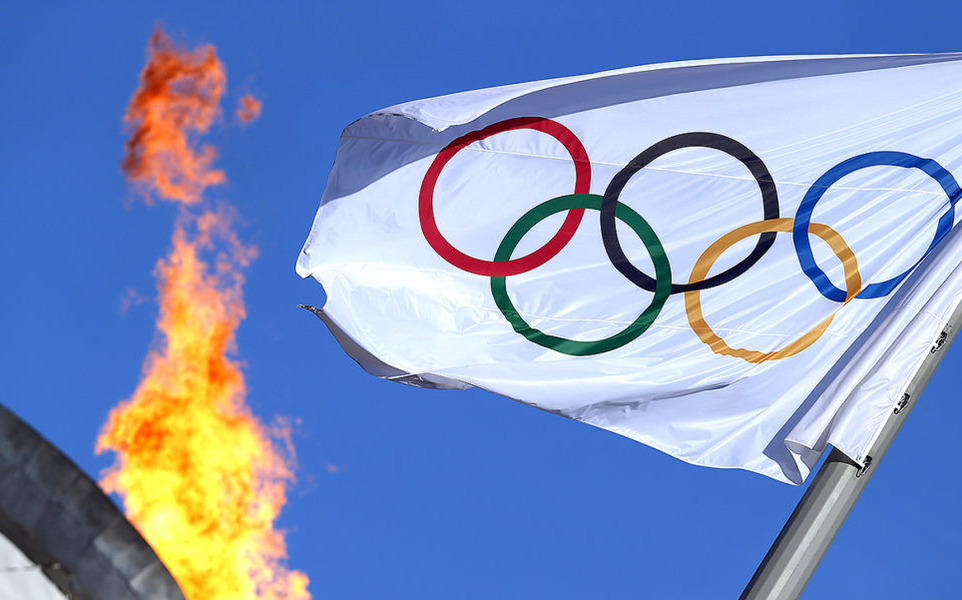 The motto of the Olympic Games "Faster, Higher, Stronger" ("Citius, Altius, Fortius") was coined by the Dominican monk Henri Didon. Photo: ski.ru
The motto of the Olympic Games "Faster, Higher, Stronger" ("Citius, Altius, Fortius") was coined by the Dominican monk Henri Didon. Photo: ski.ru
The Olympic Games are the largest sporting event and a global brand. Antique Olympics were held from 776 BC. e, modern – since 1896. We tell everything about the history of the Olympic Games, sports, scandals and symbols of the tournament, the victory at which is considered the highest achievement in sports.
The ancient games got their name from the place where the first competitions were held – Olympia.
There, athletes competed in honor of the main of the Olympian gods – Zeus. The games were held every four years and lasted for several days. The absolute achievements of the competitors were not taken into account, the winner stood out only in certain types of sports. The main thing in the Olympic Games of that time was not the results of the athletes, but the side of the festival dedicated to the praise of Zeus.
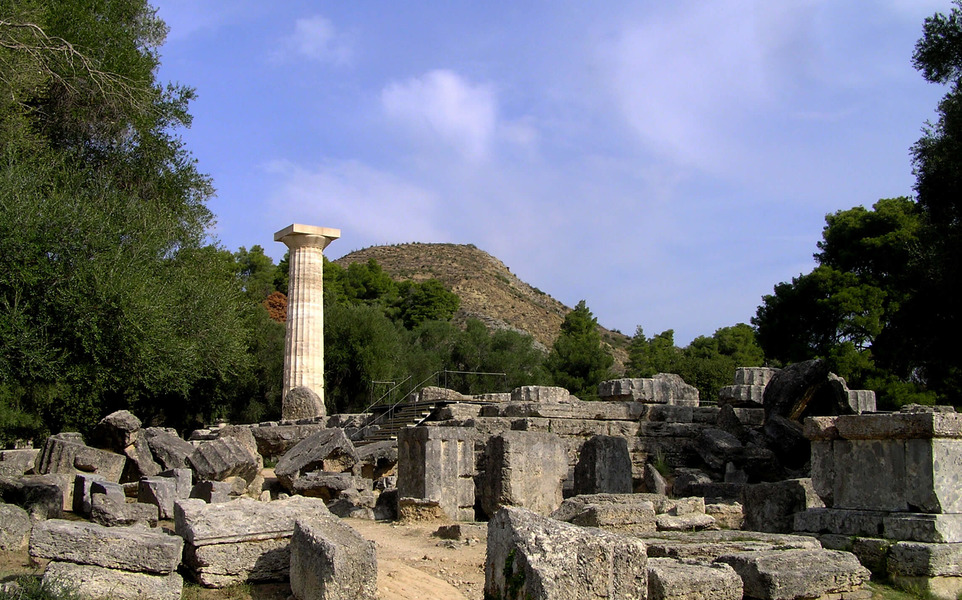 The city of Olympia was one of the oldest centers of religious worship. Photo: cpcfpu.org.ua
The city of Olympia was one of the oldest centers of religious worship. Photo: cpcfpu.org.ua
The games were held in a large stadium located near the hill of Kronos.
There is a legend about the origin of the Olympic stadium. According to it, Hercules from Crete, who arrived on the Peloponnesian Peninsula with his brothers, decided to compete with them in running near the hill of the tomb of Kronos, defeated by his son Zeus. To limit the area for competition, he measured a distance of 192 meters from the foot of the hill. The track he created formed the basis of the Olympic stadium.
Initially, athletes competed in only one discipline – running for 1 stage (about 192 meters). Later, the list expanded: it included running at stages 2 and 24, running armed athletes, jumping, javelin and discus throwing, wrestling, and chariot races.
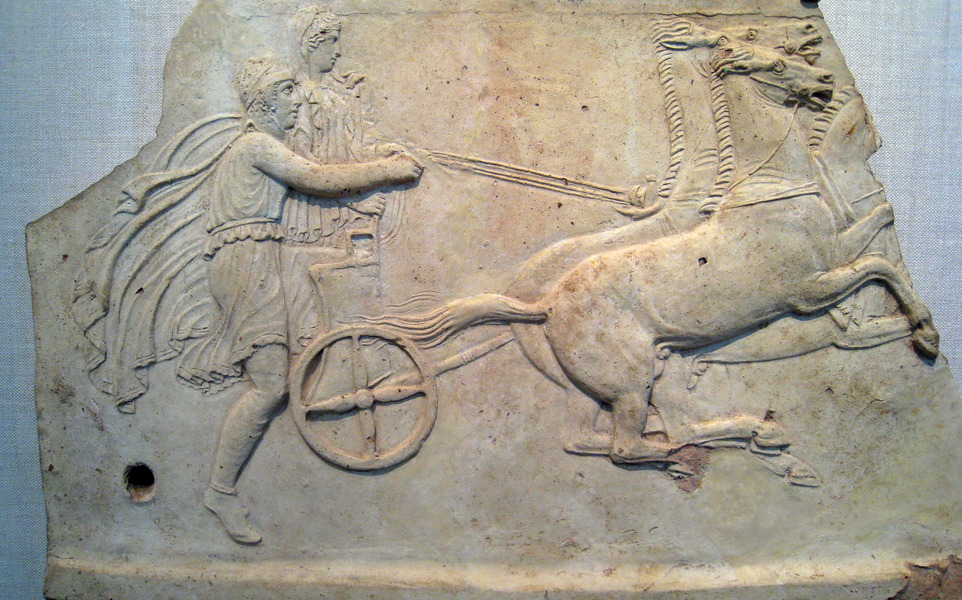 According to one of the legends, the Olympic Games arose after the king of Elis, Pelops, won the chariot race of Oenomaus, the ruler of the city of Pisa. In honor of this victory, Pelops decided to hold a competition every four years. Photo: dic.academic.ru
According to one of the legends, the Olympic Games arose after the king of Elis, Pelops, won the chariot race of Oenomaus, the ruler of the city of Pisa. In honor of this victory, Pelops decided to hold a competition every four years. Photo: dic.academic.ru
During the Olympics, hostilities were forbidden and a sacred fire was lit
In antiquity, the Olympics was not only a sports competition, but also the greatest holiday for the inhabitants of Olympia, a meeting of philosophers, a competition of the best poets and sculptors.
At the time of the Olympic Games, a truce was introduced and all clashes between the Greek policies ceased. The decision to cease hostilities was made by the kings Cleosthenes from Pisa, Ifit from Elis and Lycurgus from Sparta. The Olympic Truce even had its own name – "ekikhiriya".
The Olympics were held until 776 BC. er, but then they were not of a general Greek character. Only after that did the tradition appear to perpetuate the names of the athletes who won the Games.
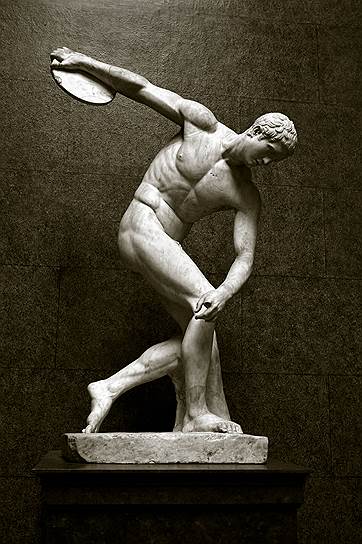 The status of the winners of the Olympic Games was especially honorable. Champions did not pay taxes, they were fed them for free in public canteens. Photo: Kommersant.ru.
The status of the winners of the Olympic Games was especially honorable. Champions did not pay taxes, they were fed them for free in public canteens. Photo: Kommersant.ru.
Another tradition of the ancient Olympic Games is the burning of fire. On the days of the summer solstice, participants in the competition, as well as the organizers and observers praised the gods. To do this, they lit the fire at the Olympic altars. Only an athlete who won in competitions along the run could light fire for sacrifices.
Also, a special role was played by the ritual of burning and delivery of Olympic Fire to the stadium. This tradition has been preserved in the centuries and exist today.
Over time, the games have become less and less religion and more sports.
At the same time, at the Olympics, the judges were increasingly bribed, and the connection of the OI with the praise of the gods was eroded and was subjected to ridiculous from the rulers.
So, Caligula commanded to transfer the statue of Zeus from Olympia to Rome and replace his head of the Supreme Divine. Nero decided to arrange the Olympics on the third year of the cycle. He did not finish in the contest of the chariot, but was recognized as the winner in the competition and received a laurel wreath – the highest award.
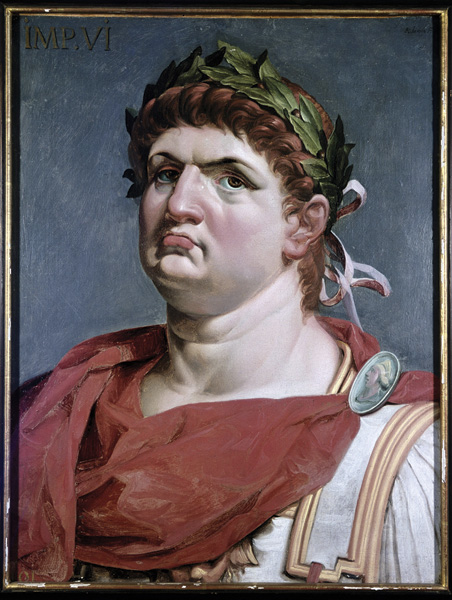 At the 212nd Olympiad, Nero became a triumph. In total, he received 1808 olive wreaths, mainly for victory in poetic and musical competitions. Photo: MediaSole.ru.
At the 212nd Olympiad, Nero became a triumph. In total, he received 1808 olive wreaths, mainly for victory in poetic and musical competitions. Photo: MediaSole.ru.
Antique OI survived his sunset under the Emperor of Feodosia. He opposed the pagan cults and forbade the game after 393. At Feodosia, the temple of Zeus was burned by the second.
OLs are obliged to their revival of Pierre de Cubert
Baron Pierre de Cubertret is a famous public and sports figure from France. He was fond of antiquity and sports, considering it one of the main factors contributing to the development of a person. After the archaeological excavations in the Olympia, which began in the 1870s, de Cubenen seriously became interested in the history of the Olympic Games and decided to revive them.
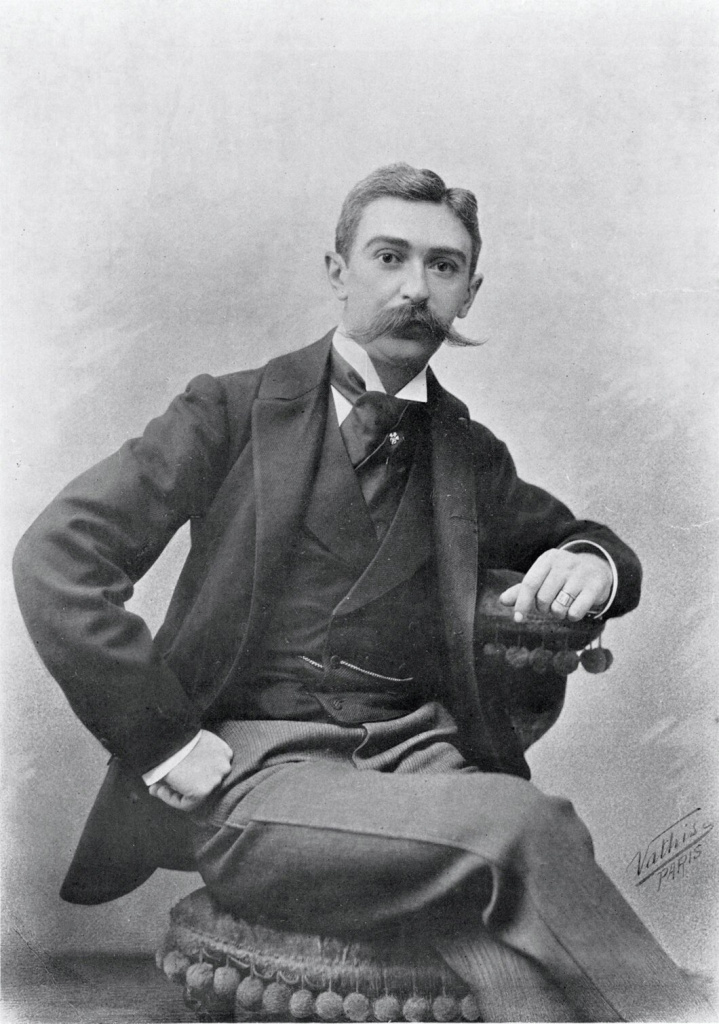 Thanks to De Cubert, the French Athletic Union (USFSA) was created. It included over 62 sports societies. Photo: noc.by.
Thanks to De Cubert, the French Athletic Union (USFSA) was created. It included over 62 sports societies. Photo: noc.by.
Big influence on de Couberten was provided by William Penny Brooks. He was a doctor and botany, and part-time the founder of the Vallet Olympic Society, held by the Vallet Olympic Games.
Within 5 years, Baron de Cubenets has prepared a meeting of other public figures, enthusiastic sports. All the idea of de Couberten combined 78 delegates. Among them was Russian – General Alexey Butovsky. The numerous delegation gathered in Paris in 1894 in the status of the Congress Renaissance of the Olympic Games. Before that, de Couberta performed in Sorbonne with the report "Revival of Olympizm" in November 1892.
Congress has become a starting point in the Renaissance of OI. Thanks to him, the International Olympic Committee (IOC) was established, a decision was made to conduct competitions every four years. The Olympic Charter and the venue of the first Olympic Games of modern times – Athens were approved.
De Cubenetn belongs to one of the most famous quotes about sports: "The main thing is not a victory, but participation" and "about sports, you are the world!".
The first games of modern times were held in 1896
Participants in the Olympic Games competed in 9 different sports crops. Among them are cycling, classic struggle, athletics, swimming, tennis. A total of 43 sets of medals were played. Representatives of 14 countries participated in the Athenian Olympic Games. Only men competed after each other. Women appeared in sports delegations in 1900.
Initially, the first Olympics were planned to spend at the stadium in Olympia, but it required large-scale restoration work.
From the very first games a lot of attention was paid to the opening ceremony. She passed on the recovered antique stadium on April 6, 1896. The rights to proclaim the competition openly awarded the Greek king of George.
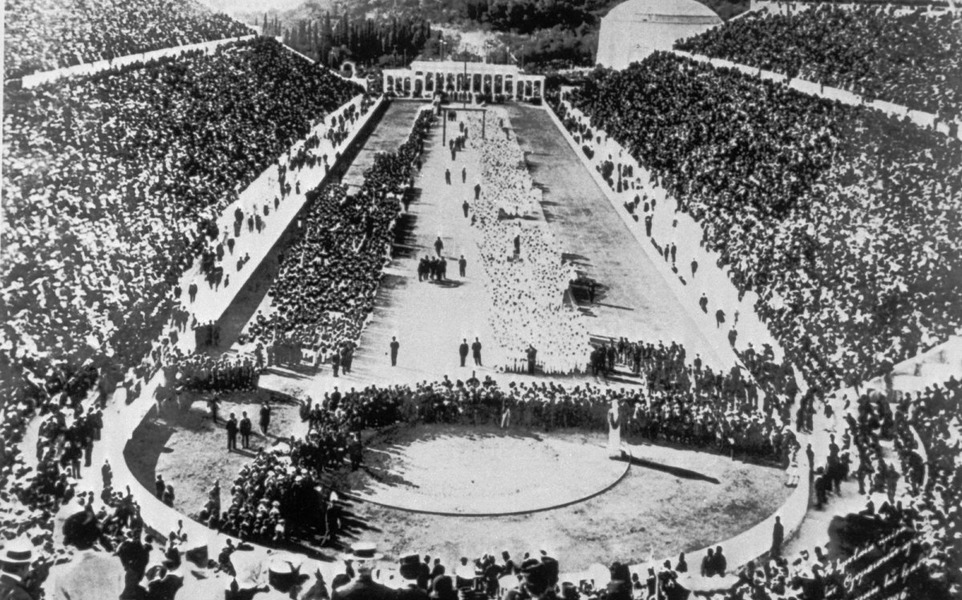 The audience of the opening ceremony of the Olympic Games was a big – 60,000 spectators. Photo: Vladtime.ru.
The audience of the opening ceremony of the Olympic Games was a big – 60,000 spectators. Photo: Vladtime.ru.
Two traditions were approved at the ceremony: the games opened the head of state, the Anthem of the Olympiad was performed at the stadium. The hymn sang in Greek. The author of the music for him was the local composer Spiros Samaros, words – the famous Greek writer Kostis Palamas.
The remaining traditions of OI, habitual viewer, were approved later. So, on the first Olympiad there was no parade of countries participating in competitions, relay and solemn lighting of fire and crossing the oath. Athletes were forced to look for themselves housing. Place participants in special residential complexes – Olympic Village, have become since 1932.
The first winner of the Olympiad was American James Connolly. Connolly won in athletics competitions by performing a triple jump by 13.71 meters. Connolly was not only an outstanding athlete, but also a writer, a journalist.
Russia did not participate in the first in the history of modern Olympic Games
Russian athletes could not get to the competition due to lack of financing. At that time, professional sports did not exist in the Russian Empire, the athletes trained in the status of lovers. They did not find sponsors to pay a trip to Greece.
On the Olympics could perform one Russian – Sports Worker Nikolai Sergeevich von Ritter. Especially for a trip to Athens, he resigned from service in the Kazny Chamber and went to Greece as a correspondent to reduce expenses on the way. Ritter planned to participate in competitions in Greco-Roman wrestling, shooting and fencing. He signed up for competition, passed trial tests, but starred because of the curb. The ritter lost the medallion, who considered the Talisman, dismissed in his own chance for a victory and refused to speak.
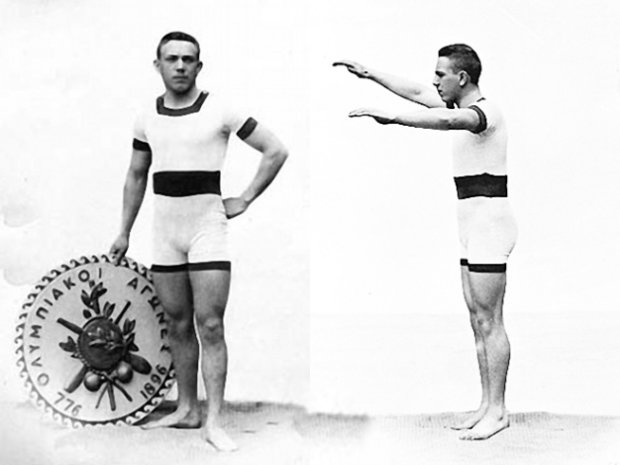 History with a medallion is the official version. However, in Kyiv, Ritter told his comrades that because of the sea disease, wine often drank and lost the form to the start of the competition. Photo: znaj.ua.
History with a medallion is the official version. However, in Kyiv, Ritter told his comrades that because of the sea disease, wine often drank and lost the form to the start of the competition. Photo: znaj.ua.
For the first time, Russia spoke at the Olympic Games in 1900 in Paris. The Russian delegation consisted of five athletes – two contesions and three fencers. None of the participants from Russia took prizes.
Olympic flag with recognizable emblem on it was first introduced in 1920
One of the most famous symbols of the Olympics was invented in 1913. At the idea of his creator of Barona de Couberten on the white canvase, five rings were interwoven between themselves. Rings were multicolored: blue, black, red, yellow and green. Rings symbolized parts of the world. Coming, they formed a single whole and demonstrated the unity of all nations before the sport.
Details of the official symbolism of the Olympic Games are changing every four years, all changes are agreed by the IOC with the Council of the country in which OI passes. So, in 1960, three-dimensional silver rings were presented on the emblem. In 1976, all Olympic Rings on Summer OI were performed in red, and the upper deformed – stretched into semicircles.
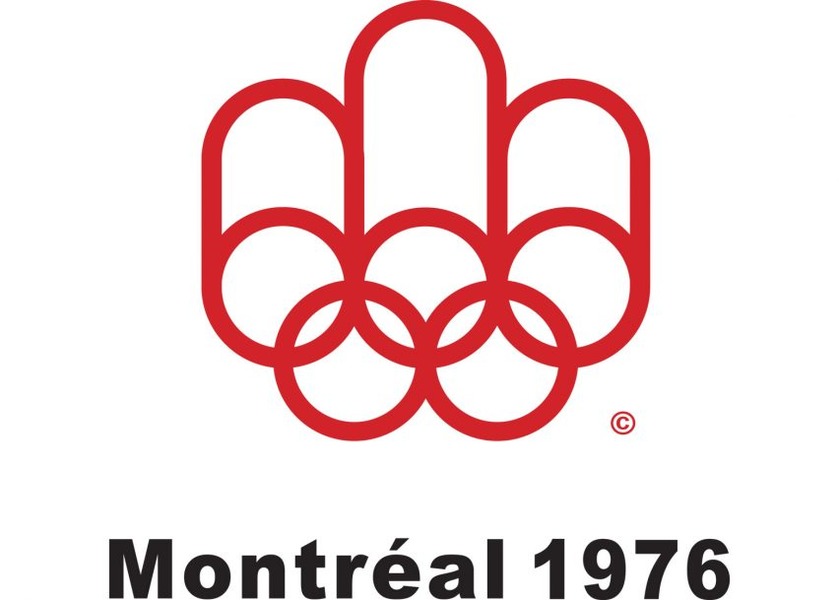 So it looked like the emblem of the 1976 Olympic Games in Montreal. Talisman OI became Beaver Amik. Photo: Dezeen.com.
So it looked like the emblem of the 1976 Olympic Games in Montreal. Talisman OI became Beaver Amik. Photo: Dezeen.com.
Winter OIs are held since 1924
Before that, some winter sports was included in the Summer Olympic Games program. So, the skaters first competed on the 1908 Summer Olympiad, and the Olympic Hockey Tournament with the washer first passed in the 1920s.
Initially, the Winter Olympics were held in the same year as Summer. Since 1994, they began to spend them two years after summer competitions.
The basis of the Paralympic Games contributed to the neurosurgeon
His name was Ludwig Gutman. Guttman worked with disabled people who had damaged to the spine, and approved sports classes as one of the fundamental rehabilitation means. The German neurosurgeon became the founder of the stock Mandeville games, which for the first time passed in 1948 in parallel with the Olympics in the UK. In Guttman's games, paralyzed men and women participated, mostly former military. After the game began to take place annually, collecting disabled athletes in many countries. They served as a reason to create the stock Mandeville Federation and received recognition of the IOC. In 1960, the 9th Annual International Stoke Mandeville Games were held in Rome a few weeks after the Olympics. It is believed that these were the first paralympic games. Since then, paralympics are held in one year with conventional Olympic Games.
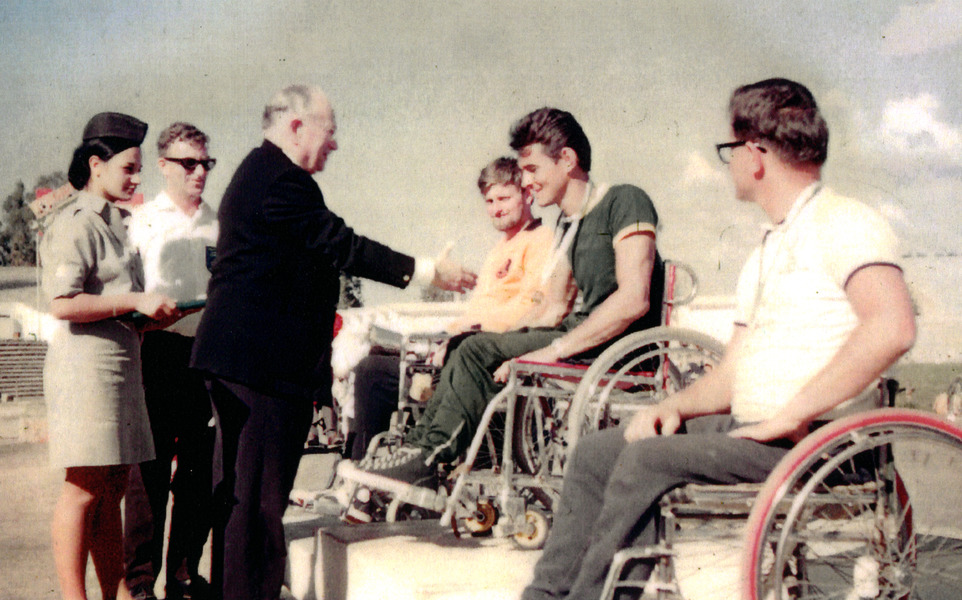 In 1961, Guttman became the founder of the Association of Disabled Athletes of Britain. Photo: wikiwand.com.
In 1961, Guttman became the founder of the Association of Disabled Athletes of Britain. Photo: wikiwand.com.
Paralympic movement sets a goal to create all the conditions for people with special opportunities to achieve sporting success on a par with atlifices participating in the Olympiads.
The modern Olympiad ceased to be a reason for stopping bloodshed. Proof – terrorist attack in Munich
At the 1972 Olympics in Munich, terrorists from the Black September organization took Israeli athletes hostage in one of the buildings of the Olympic Village.
Black September is an organization created by Palestinian radicals in the early 70s. It owes its name to the armed conflict in Jordan in 1970. Prior to the Munich attack, Black September claimed responsibility for the assassination of Jordanian Prime Minister Wasfi Tel, the hijacking of a passenger plane in May 1972. The terrorist attack at the Olympic Games was planned by "Black September" long before the start of the competition. Later it turned out that the German authorities received a warning about the plans of the militants three weeks before the start of the Olympics, but ignored it.
The terrorists easily entered the territory of the Olympic Village on the night of September 4-5. There were no armed guards at the facilities, and at the entrance to the territory there was no pass regime. The terrorists were helped by water polo players from Team Canada. After the victory over the USSR national team, the Canadians returned to their corps in high spirits. The water polo players mistook the terrorists for athletes (they were all dressed in tracksuits) and helped them climb over the fence. On the same night, members of the Black September seized building No. 31, in which Israeli athletes lived. Two athletes managed to escape, two more were seriously injured and later died.
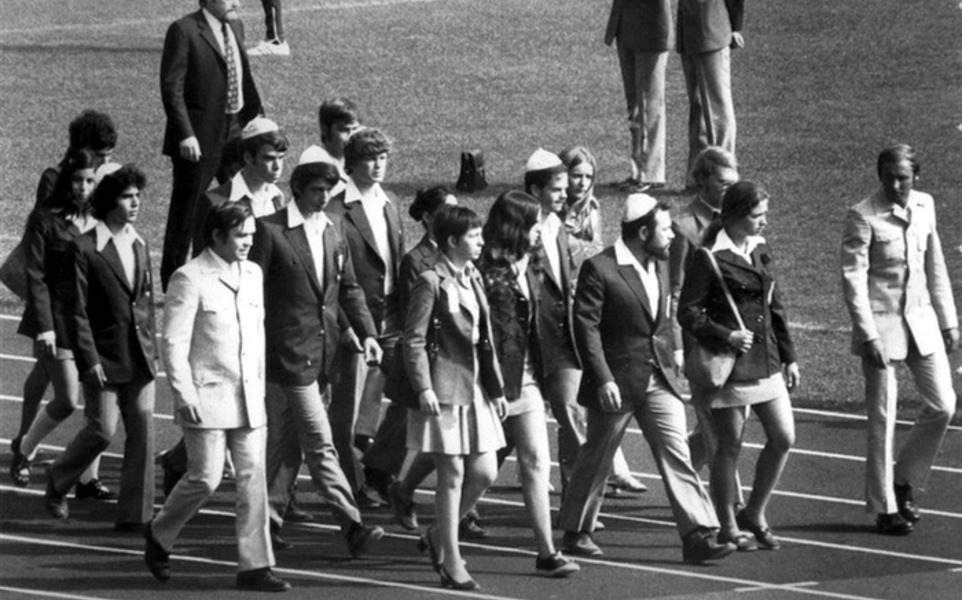 Women from the Israeli team were saved by the fact that they lived in another building of the Olympic Village. Photo: warspot.ru
Women from the Israeli team were saved by the fact that they lived in another building of the Olympic Village. Photo: warspot.ru
In the morning, the terrorists put forward demands: to release and send to Egypt more than two hundred Palestinians who are in prisons in Israel and Western Europe. Israel immediately refused to negotiate and offered Germany assistance in a special operation. The German side rejected the Israeli proposal.
Even when the terrorists captured the building, the Olympics continued. The competitions were held until 16:00 on September 5 and were suspended only after the news of the death of two hostages.
The new requirement of the terrorists was the plane, which was supposed to deliver the militants to Cairo. The terrorists requested two helicopters to be transferred to the airport. The helicopters were prepared, hostages and militants were placed in them.
The German authorities were preparing a special operation, according to which the members of the "Black September" were to be eliminated at the airport. There, police officers dressed as crew members and snipers were waiting for them. Everything didn't go according to plan. The police did not know how many terrorists would be on board and were afraid of the militants. In addition, equipment was not brought to the airport, and there was no communication between the participants in the operation and the leadership. As a result of chaotic shooting and several explosions, all the hostages from the helicopters were killed.
After the shootout at the airport, a funeral ceremony was held at the Olympic Stadium. It was attended by 3,000 athletes and 80,000 spectators. The USSR severed diplomatic relations with Israel in 1967, and Soviet athletes did not attend the ceremony.Many representatives of the USSR delegation were outraged by the official decision of the country's leadership.
Most of all the money was spent on the Olympic Games in Sochi
The costs of the Winter Olympic Games – 2014 amounted to about 50 billion dollars. For comparison: about $ 49 billion, Rio de Janeiro in 2016 – about 20 billion were spent on playing games in Beijing in 2008.
The Olympiad left behind a lot of sports facilities, at present most of them are used only for training athletes. One of the main objects of OI in Sochi is an Olympic Park, located on the Black Sea coast. For the construction of all objects in the park left for 6 years.
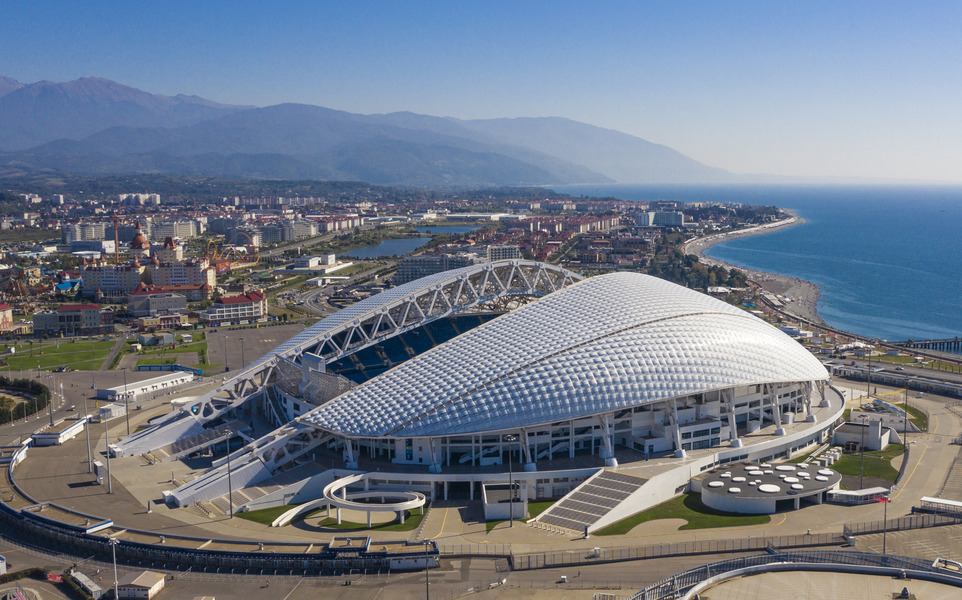 Translated from Adygei "Fisht" means "white frost", "sad". Photo: wikimedia.org.
Translated from Adygei "Fisht" means "white frost", "sad". Photo: wikimedia.org.
The most large-scale construction in the Olympic Park is the Fisht Stadium, which held the opening and closing ceremonies. Fisht cost the organizers of 27.5 billion rubles.
Doping is one of the main problems of OI. Russia more often lied medals due to doping
Based on the Olympic Charter – the fundamental document of the competition, the IOC has the right to deprive the received awards of athletes shown in doping. If the athle was a member of the team, the medals are deprived of not only he, but also the whole team.
Doping – substances that make an athlete more hardy, increase performance, increase physical and psychological stability. Almost all similar means are prohibited for use during training and sports.
Most often, due to doping, the awards of representatives of Russia (31 times) were deprived. In second place – athletes from the USA (15), on the third – Kazakhstan athletes (8).
A record-in-one canceled due to doping medals was the 2008 Olympics in Beijing – 26 awards. On the opening day of the Games, the World Anti-Doping Agency (WADA) has entered into force. According to them, to reveal the athlete doping in the body, experts could take samples several times a day. Athletes who missed mandatory testing were considered violators.
In front of the Olympics-2018, a doping scandal with the Russian national team broke out in Pchenchhan. In 2014, a documentary film was shown on the German channel ARD, in which Russian runner Julia Stepanov and her spouse, a former member of Rusada (Russian Anti-Doping Agency) talked about how Russia uses Doping and hides its application. Wada became interested in the film and the beginning of an independent investigation. As a result of the investigation, a number of accusations of Rusada was nominated. The Russian agency was forced to suspend their activities in the main areas, and IOC made a decision on the removal of the Russian Olympic Committee from participating in the OI in Pchenchkhan. Athletes not appeared in doping could participate in competitions under a neutral flag and receive awards for the Olympic anthem.The removal of Russia from participation in the competition was the first such case in the history of the Olympic Games.
 Grigory Rodchenkov, ex-director of the Russian Anti-Doping Center, played a big role in the doping scandal. He became a WADA informant and spoke about the existence of a state doping program in Russia. Photo: TASS
Grigory Rodchenkov, ex-director of the Russian Anti-Doping Center, played a big role in the doping scandal. He became a WADA informant and spoke about the existence of a state doping program in Russia. Photo: TASS
In the overall medal standings of the Games in Pyeongchang, Olympic athletes from Russia became only sixth, having won 17 medals, of which only 2 were of the highest value. In 2019, WADA banned Russia from organizing and hosting world sports competitions for four years. The agency also deprived RUSADA of the status of compliance and allowed only "clean" athletes from Russia under a neutral flag to international competitions.
The list of OI disciplines is constantly updated. It can even include eSports
At the modern Summer Olympics, athletes compete in 28 sports, in winter – in 7. In total, the Olympic Games program includes 57 disciplines. The list is not static. There are disciplines that were featured in the Olympics but are now excluded. For example, this is a water-motor sport, cricket, baseball.
The list of disciplines is not only reduced, but also replenished. So, in 2015, the Korean Association of Electronic Sports included e-sports in the list of Olympic disciplines of the 2nd level. In order to be included in the OI program, eSports needs to receive the status of a discipline of the 1st level.
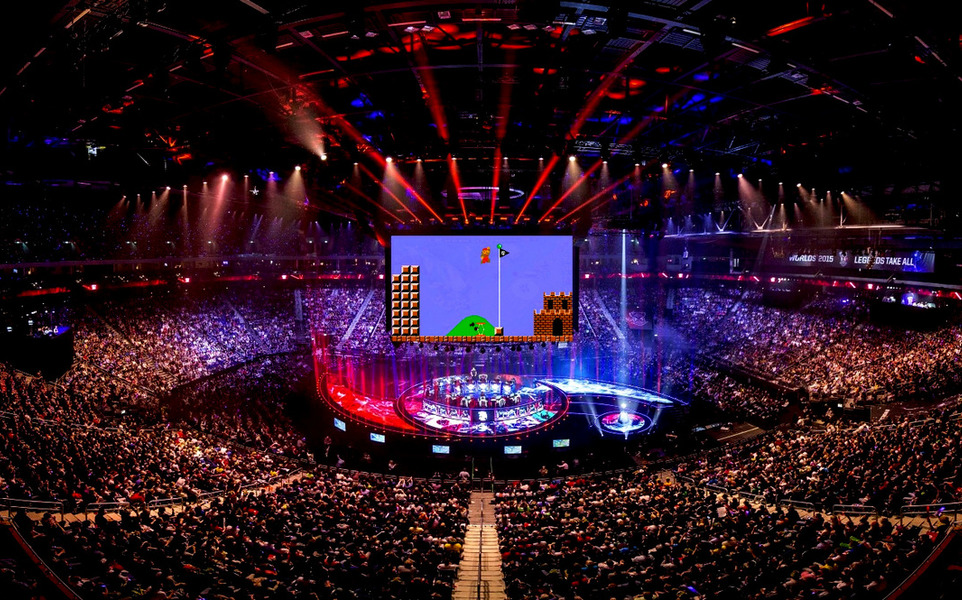 One of the members of the IOC, Tony Estanguet, believes that eSports should be included in the list of Olympic disciplines so that the Olympic Games remain relevant for new generations. Photo: www.habr.com
One of the members of the IOC, Tony Estanguet, believes that eSports should be included in the list of Olympic disciplines so that the Olympic Games remain relevant for new generations. Photo: www.habr.com

